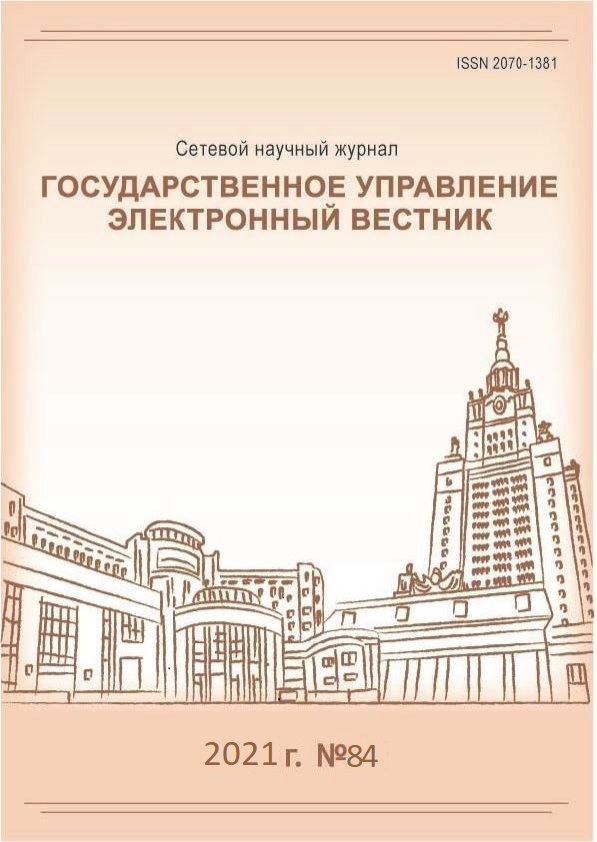Повышение квалификации государственных гражданских служащих субъектов РФ в условиях цифровизации
Ключевые слова:
Цифровизация социально-экономических процессов, региональная экономика, система профессионального образования, цифровые компетенции, государственное управлениеАннотация
Актуальность исследования обусловлена значительной положительной динамикой внедрения информационно-коммуникационных технологий в деятельность органов государственного управления. В статье рассматривается ряд вопросов, посвященных разработке методологических подходов к формированию цифровых компетенций как основы обеспечения профессиональными ресурсами регионального государственного управления. В качестве методов исследования использованы статистический анализ информации о динамике цифровизации социально-экономических процессов в Российской Федерации, моделирование перечня компетенций государственного служащего, работающего с большими базами данных. В статье проводится анализ динамики внедрения информационно-коммуникационных технологий в сферу государственного управления. Ретроспективное исследование показало, что, во-первых, значительными темпами растет доля пользователей сети Интернет в общей численности населения, во-вторых, получение населением государственных и муниципальных услуг в электронной форме возросло за семь лет более чем в 5 раз, в-третьих, ежегодно увеличивается доля органов государственного управления, использующих системы электронного документооборота, автоматический обмен данными между информационными системами, программные средства для предоставления доступа к базам данных организации через глобальные информационные сети. Проведен анализ правовой базы, регламентирующей процессы внедрения и использования механизмов информатизации управления в органах государственной власти, а также выделены основные направления применения технологий работы с большими данными в государственном управлении. Предложены перечень и описание компетенций, необходимых государственным служащим для работы с большими данными; описан процесс апробации компетентностной модели. Предполагается, что повышение квалификации государственных гражданских служащих в сфере управления большими данными позволит обеспечить превалирование интеллектуальных и информационных факторов в структуре государственного управления регионов РФ.
Библиографические ссылки
Васильева Е.В., Пуляева В.Н., Юдина В.А. Развитие цифровых компетенций государственных гражданских служащих Российской Федерации // Бизнесинформатика. 2018. № 4(46). С. 28–42. DOI: https://doi.org/10.17323/1998- 0663.2018.4.28.42.
Глазьев С.Ю. О новой парадигме в экономической науке // Государственное управление. Электронный вестник. 2016. № 56. С. 5–39. DOI: 10.24411/2070-1381-2016-00017.
Дианова Е.М. Электронное правительство как механизм воздействия на транзакционные издержки в государственном секторе // Информационное общество. 2012. № 4. С. 34–41.
Иванова М.В. Системы оценки цифровой трансформации государственного управления: сравнительный анализ российской и зарубежной практики // Государственное управление. Электронный вестник. 2020. № 79. С. 246–270. DOI: 10.24411/2070-1381-2020-10058.
Караковский К.А., Обухова Л.А. Управление профессиональным развитием государственных гражданских служащих в цифровой экономике // Гуманитарные, социально-экономические и общественные науки. 2020. № 2. С. 56–60. DOI: 10.23672/SAE.2020.2.56073.
Карапетян Н.С., Каунов Е.Н. Трансформация компетенций государственных служащих в условиях развития цифровых технологий // Креативная экономика. 2020. Т. 14. № 6. С. 993–1010. DOI: 10.18334/ce.14.6.110503.
Кудина М.В., Сухарева М.А. Современное состояние непрерывного образования в экономике знаний // Государственное управление. Электронный вестник. 2018. № 71. С. 285–306. DOI: 10.24411/2070-1381-2018-00113.
Островский А.В., Кудина М.В. Новая парадигма образования в эпоху цифровой трансформации государства // Государственное управление. Электронный вестник. 2020. № 78. С. 229–244. DOI: 10.24411/2070-1381-2020-10041.
Попов Е.В., Семячков К.А. Инструментарий развития цифровых технологий в государственном секторе // Региональная экономика: теория и практика. 2018. Т. 16. № 7. С. 1320–1337. DOI: https://doi.org/10.24891/re.16.7.1320.
Evans S.H., Clarke P. The Computer Culture. Indianapolis: White River Press, 1984.
Hinrichsen J., Coombs A. The Five Resources of Critical Digital Literacy: A Framework for
Curriculum Integration // Research in Learning Technology. 2014. Vol. 21. DOI: https://doi.org/10.3402/rlt.v21.21334
McKee-Waddell S. Digital Literacy: Bridging the Gap with Digital Writing Tools // Delta Kappa Gamma Bulletin. 2015. Vol. 82. Is. 1. P. 26–31.
Reedy K., Parker J. Digital Literacy Unpacked. London: Facet Publishing, 2018. DOI: https://doi.org/10.29085/9781783301997.
Загрузки
Опубликован
Наиболее читаемые статьи этого автора (авторов)
- Леонтьева Лидия Сергеевна, Авилкина Светлана Викторовна, Система высшего образования как стратегический ресурс регионального развития , Государственное управление. Электронный вестник: № 86 (2021)
Похожие статьи
- Архипова Марина Юрьевна, Соболев Максим Андреевич, Исследование динамики развития национальной инновационной системы России (часть 1) , Государственное управление. Электронный вестник: № 90 (2022)
- Титова Анна Сергеевна, Сухарева Мария Алексеевна, Федосеев Алексей Игоревич, Анализ стратегий сообществ в контексте развития цифровой экономики и ее социальных последствий , Государственное управление. Электронный вестник: № 93 (2022)
- Кудина Марианна Валерьевна, Воронов Александр Сергеевич, Гаврилюк Артём Владимирович, Внедрение цифровых платформ для принятия решений в государственном управлении , Государственное управление. Электронный вестник: № 100 (2023)
- Гаврилюк Артём Владимирович, Чжао Аньжань, Механизм функционирования и перспективы развития гиг-экономики. Часть 2 , Государственное управление. Электронный вестник: № 108 (2025)
- Лобкова Елена Валерьевна, Методические аспекты оценки цифровых проектов для их ранжирования и отбора в целях включения в стратегические документы цифровой трансформации субъектов Российской Федерации , Государственное управление. Электронный вестник: № 98 (2023)
- Иващенко Наталия Павловна, Энговатова Александра Андреевна, Инновации для рынка труда: международный опыт формирования национальных систем компетентностей , Государственное управление. Электронный вестник: № 106 (2024)
- Воронов Александр Сергеевич , Еремин Александр Владимирович, Серебренников Сергей Сергеевич, Кадровый резерв образовательных организаций высшего образования и научных организаций: возможности формирования и управления на базе советов молодых ученых , Государственное управление. Электронный вестник: № 101 (2023)
- Гаврилюк Артём Владимирович, Чжао Аньжань, Алгоритмизация процессов управления в гиг-экономике , Государственное управление. Электронный вестник: № 102 (2024)
- Кудрявцева Ольга Владимировна, Васильев Сергей Владимирович, Реализация Цели устойчивого развития в сфере обращения с отходами в России через национальные проекты , Государственное управление. Электронный вестник: № 109 (2025)
- Юнусова Гульназ Рашитовна, Человеческий капитал в развитии экономики региона: высококачественное высшее образование как инвестиции в человеческий капитал , Государственное управление. Электронный вестник: № 88 (2021)
Вы также можете начать расширеннвй поиск похожих статей для этой статьи.




